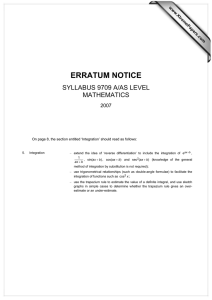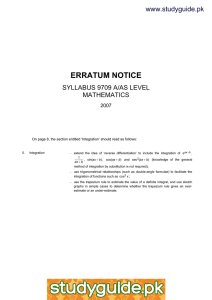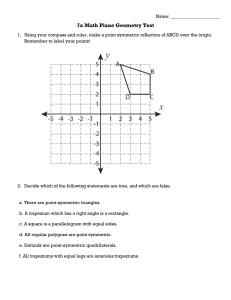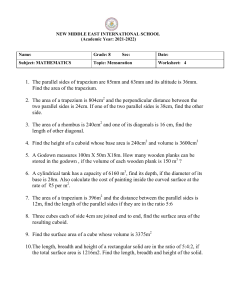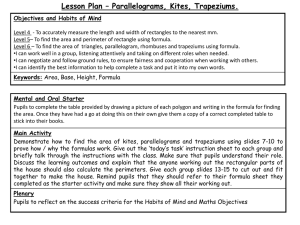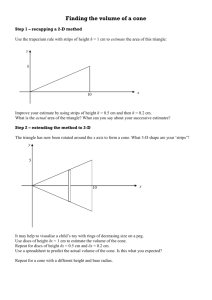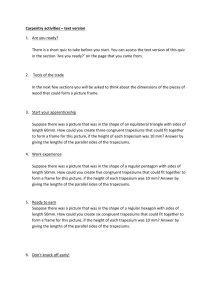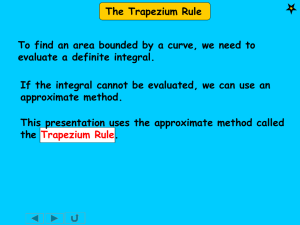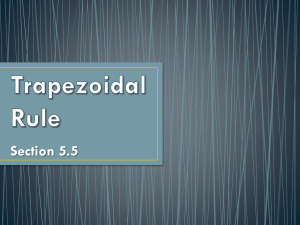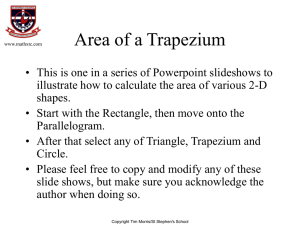the Trapezoidal rule
advertisement
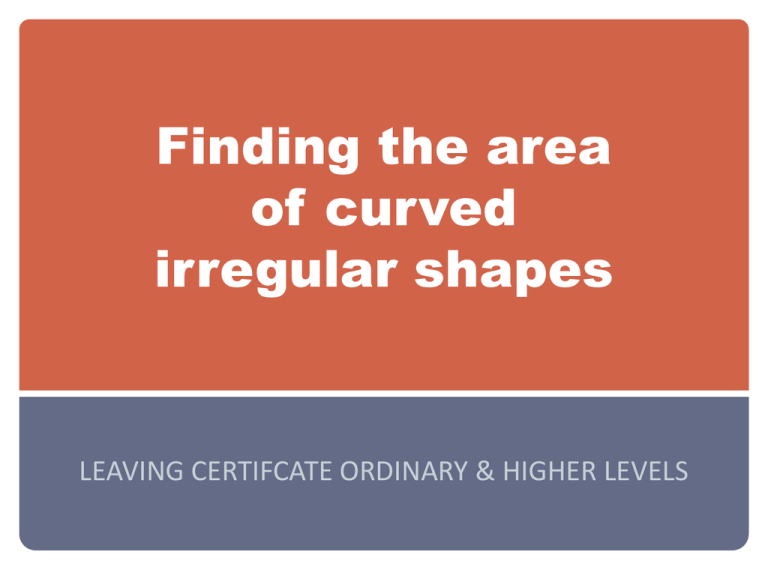
Finding the area of curved irregular shapes LEAVING CERTIFCATE ORDINARY & HIGHER LEVELS Find the area of your shape Work as accurately as you can in centimetres! 1A You found the area of an A4 page! 1B 1A Trapezoidal Rule (a) (b) (c) (d) 2.4 m 2m Find the area of the stained glass window. Draw a scaled diagram of the window using 1 m = 5 cm on square paper. Divide the shape up into: (i) 4 trapezium's (ii) 5 trapezium’s (ii) 10 trapeziums and calculate the area of the window each time, (using the trapezium’s). Which part produced the smallest error and why? 𝜋 1 𝐴 = 2 × 2.4 + 2 2 = 6.37 𝑚2 𝐴 ≈ 6.32 6.17 𝑚2 6.22 6.37 6.37−−6.32 6.17 6.22 % %Error Error== ××100 100==0.79% 3.14% 1.5% 6.37 6.37 Formula and Tables Page 12 What do all the terms in the formula mean? Derivation of the formula 𝐴 = 𝑇1 + 𝑇2 + 𝑇3 + 𝑇4 + ⋯ + 𝑇𝑛 1 1 1 1 1 𝐴 = 𝑦1 + 𝑦2 ℎ + 𝑦2 + 𝑦3 ℎ + 𝑦3 +𝑦4 ℎ + 𝑦4 +𝑦5 ℎ + ⋯ + 𝑦𝑛−1 +𝑦𝑛 ℎ 2 2 2 2 2 𝐴= ℎ 𝑦 +𝑦2 +𝑦2 +𝑦3 +𝑦3 +𝑦4 +𝑦4 +𝑦5 + ⋯ + 𝑦𝑛−1 +𝑦𝑛 2 1 ℎ 𝐴 = 𝑦1 +𝑦𝑛 + 2(𝑦2 +𝑦3 +𝑦4 +𝑦5 + ⋯ + 𝑦𝑛−1 ) 2 𝒂 𝒉 𝒃 𝐴= 1 𝑎+𝑏 ℎ 2 Trapezium Rule Why Trapezoidal Rule rather than Simpson’s Rule? 1. Easier to derive and understand what is going on. 2. Area of a trapezium is on Strand 3 for Ordinary Level students from 2015. (N.B. It is on for Foundation Level in 2014) 3. For many practical cases it (the Trapezoidal rule) is accurate enough. 2002 2013 HL Using 5 intervals approximate the following integral 𝐴≈ A ℎ 𝑦 + 𝑦𝑛 + 2 𝑦2 + 𝑦3 + 𝑦4 + ⋯ + 𝑦𝑛−1 2 1 h y 1 y6 2( y2 y3 y4 y5 ) 2 y1 1 (0)2 1 y2 1 (0.2)2 0.9797 y3 1 (0.4)2 0.9165 y4 1 (0.6)2 0.8 yn1 y5 1 (0.8)2 0.6 yn y6 1 (1)2 0 1 1 0 0 1 x 2 dx 0.2 1 0 2 0.9797 0.9165 0.8 0.6 2 1 x 2 dx 0.75924 1 0 1 − 𝑥 2 𝑑𝑥. Other Methods 1 1 − 𝑥 2 𝑑𝑥 0 𝐴𝑟𝑒𝑎 = 1 0 𝑦 𝑑𝑥 𝑦 = 1 − 𝑥2 𝑦2 = 1 − 𝑥2 𝑥2 + 𝑦2 = 1 𝜋 𝐴𝑟𝑒𝑎 = = 0.7853 4 1 − 𝑥 2 𝑑𝑥 𝑥 = sin 𝜃 𝑑𝑥 = cos 𝜃 𝑑𝜃 1 (1 + cos 2𝜃)𝑑𝜃 2
